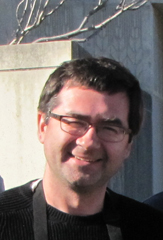May 2, 2013
K-State researcher leads international team comparing genetic code of ancient and modern wheat cultivars

Eduard Akhunov knows that sometimes, in order to prepare for the future, we need to study the past.
The Kansas State University plant pathologist is leading an international team of researchers in comparing the genetic code of ancient wheat varieties to that of modern varieties with a goal of improving wheat for different growing conditions throughout the world.
"In this study we have been working to understand how modern breeders have impacted the wheat genome during the last 150 years of breeding," Akhunov said.
The research, which was published in the April 30 online edition of the Proceedings of the National Academy of Sciences, lays the groundwork for creating new varieties adapted to grow in diverse agro-climatic conditions across the world.
"For this purpose we compared variation in the DNA sequence — genetic code — between ancient and modern wheat varieties. The comparison helped us to detect the variants of genes that were selected by breeders to make wheat cultivars that can be grown from Argentina to Norway and Russia," Akhunov said.
In addition to Akhunov, who serves as the primary investigator on the project, the team includes K-State plant pathologists Shichen Wang, Alina Akhunova, Cyrille Saintenac and Seifollah Kiani and an international consortium of wheat geneticists from the United States, Australia, United Kingdom, Germany, France, India and Mexico.
The team has identified selection targets associated with wheat improvement including regions containing genes involved in the regulation of flowering time, development and resistance to a fungal disease.
"Our study provides first insights into the role of humans in shaping the genetic diversity of wheat," Akhunov said. "By understanding better the changes made to the wheat genome, we can develop better approaches to improve this staple crop."
"This is the largest diversity analysis project so far performed in wheat that includes nearly 3,000 wheat varieties collected across the world," he said.
"Kansas wheat farmers appreciate the work Dr. Akhunov does and his expertise," said Justin Gilpin, chief executive officer of Kansas Wheat, an organization comprised of the Kansas Wheat Commission and the Kansas Association of Wheat Growers. "There is momentum in wheat research, with many good things happening. KSU and its teams of wheat researchers are positioned to lead way. This investment and work across the College of Ag will ultimately mean improved genetics in the hands of wheat farmers faster."
As part of the project, the team worked in collaboration with a biotechnology company, Illumina, to develop new tools for the analysis of the wheat genome. The tools allow for the fast, low-cost screening of a large number of wheat lines in search of valuable genes, Akhunov said. This information can help breeders to develop high-yielding wheat cultivars resistant to diseases caused by fungi, bacteria or viruses, with improved nutritional qualities of wheat flour and tolerant to drought and heat, he added.
The project was funded by the U.S. Department of Agriculture’s National Institute of Food and Agriculture, or NIFA.
"The next step is to perform the detailed analysis of the whole genomes of multiple wheat cultivars using new sequencing technologies and, fortunately, we already obtained funding for this work," Akhunov said.
In the Triticeae Coordinated Agricultural Project, funded by USDA’s NIFA, Akhunov’s team is sequencing 200 wheat varieties. The data, combined with resources developed by the International Wheat Genome Sequencing Consortium, or IWGSC, will lay the foundation for next-generation breeding strategies that use modern genomics and informatics approaches to improve wheat, the researcher said. Akhunov is a member of the IWGSC coordinating committee.
